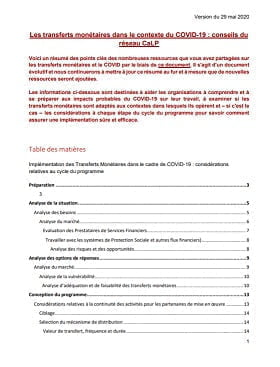COVID-19 et transferts monétaires : ressources, orientations, événements et questions

Nous espérons que vous tenez à l’abri en ces temps incertains. Alors que le COVID-19 continue de se propager dans le monde entier, il semble que chaque communauté sera touchée d’une manière ou d’une autre, que ce soit directement par le virus ou par ses répercussions économiques et autres.
Il y a eu beaucoup de discussions au sein du réseau du CALP Network sur ce que la pandémie signifie pour l’utilisation des Transferts Monétaires et pour les opérations des membres du CALP.
Orientations et ressources
- Orientations du CALP sur le COVID et les Transferts Monétaires (disponible en arabe, anglais, espagnol), elle résume les points clés des orientations des différents acteurs du réseau, et est mise à jour régulièrement.
- Collection de ressources (liste complète à consulter), apprentissage et questions ici, merci de continuer à partager !
- Autres ressources et liens utiles ci-dessous.
Image principale : Columbia University in the City of New York
Contenu associé

ICRC – Implications de la pandémie COVID-19 sur les transferts monétaires : Conseils et recommandations
Guides et outils
Cette liste de recommandations sert à aider les équipes terrain à réfléchir aux différentes manières d’:
1) éviter que nos transferts monétaires contribuent à propager le COVID-19 ;
2) orienter l’adaptation de nos transferts monétaires dans le cadre de la pandémie COVID-19;
3) anticiper certaines évolutions et impacts sur les marchés.
Cette liste de recommandations...

Les transferts monétaires dans le contexte du COVID-19 : conseils du réseau le CALP Network
Guides et outils
Voici un résumé des points clés des nombreuses ressources que vous avez partagées sur les transferts monétaires et le COVID par le biais de ce document. Il s’agit d’un document évolutif et nous continuerons à mettre à jour ce résumé au fur et à mesure que de nouvelles ressources seront ajoutées.
Les informations ci-dessous sont destinées à aider les organisations à...
Contenu récent
Aucun résultat trouvé
Contenu indisponible actuellement.


